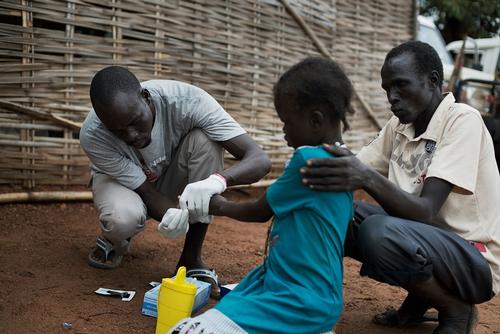Juba — The ongoing conflict in South Sudan affecting directly the north and the east of the country has diverted attention from ongoing regular healthcare concerns like the malaria epidemic which is affecting the west of the country. There have been insufficient distributions of antimalarial drugs in many peripheral health centres and, as a consequence, Médecins Sans Frontières (MSF) has reported an increase in the number of severe life-threatening cases.
Every year with the rainy season, mosquitoes multiply in standing water and the number of malaria cases increases. This year the epidemic is particularly widespread in western parts of the country. Unusually prolonged and heavy rainfall in many areas and the lack of available treatments in some peripheral health centres means that many patients have had to travel to MSF health structures to be treated. They arrive after hours or days of travel in serious medical condition.
MSF health facilties in Aweil and Pamat, Northern Bahr el Ghazal state, Gogrial in Warrap state, Yambio in Western Equatoria state and Agok in Abyei territory have treated nearly 60,000 patients since the beginning of the year. More than 10% of them have been hospitalized. This is more than triple the number of patients seen during the same period of last year.
“MSF cannot cover all the needs in Northern Bahr el Ghazal, Warrap, Western Equatoria states and Abyei territory" said Renee Madrolle, MSF project coordinator in Aweil. “More international health actors must be mobilized along the Ministry of Health to provide access to antimalarial treatment to the population.”
The partner organisations of the Ministry of Health have been ineffective in distributing diagnostic rapid tests and drugs due to the current conflict and because of structural problems in the supply chain. These supply problems have had two major consequences on the health system. Firstly in terms of timely distribution: the drugs in Juba could not be delivered at the beginning of the rainy season when the first spike of malaria cases occurred between the end of May and beginning of June 2014. Secondly, there were not enough drugs available for a comprehensive distribution in peripheral health centres and only a few facilities received them. As a consequence, there are large areas affected by malaria where people lack access to treatment.
In response to these needs, MSF urgently brought extra supplies of malaria rapid diagnostic tests and malaria treatments in most of the MSF projects in the West affected by malaria. MSF has set up in Gogrial health centre a dedicated day care malaria zone to cope with the overwhelming number of patients.
In June MSF also opened activities in the outpatient department of Aweil hospital to identify new infections and provide treatment. The most severe cases are hospitalized in a specific 35-bed treatment unit set up by MSF in July inside the hospital. Today this capacity is insufficient.
In September, 71% of cases in the paediatric department in Aweil hospital were malaria. MSF also regularly organizes mobile clinics in the most remote areas to reduce the number of severe cases coming to the hospital due to late treatment. In September, MSF treated in the western part of the country more than 10,000 cases of malaria.
“Some patients die while they could have been easily saved if they had had access to treatment earlier,” said Renee Madrolle, project coordinator for MSF in Aweil state hospital which is the reference hospital of the Northern Bahr el Ghazal. “Malaria is the first cause of mortality in Aweil during the rainy season, and children are the most affected.”
MSF currently has 25 projects in in 9 of the 10 states of South Sudan. It employs 3,300 national staff and 350 international staff to carry out its mission.



